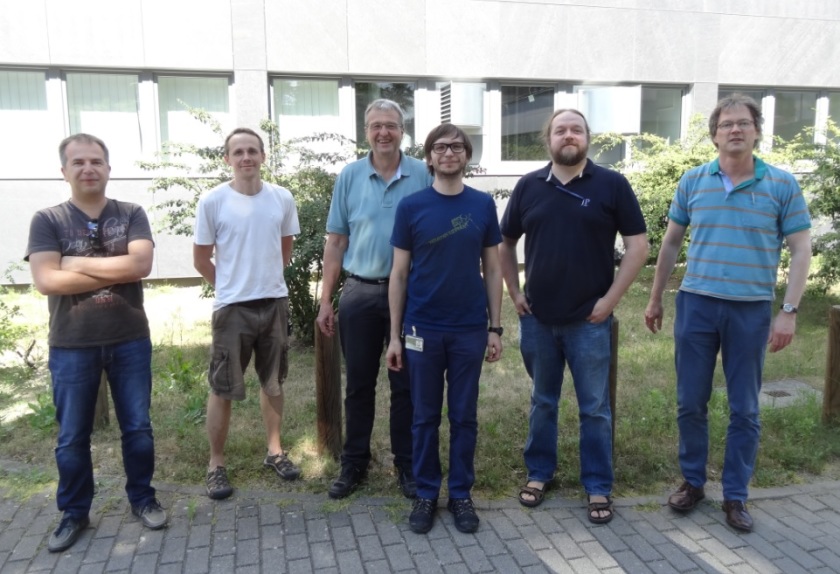Kickoff for Joint Lab with IFW Dresden

Kickoff with a meeting on 19 June 2017: Prof. Borisenko, Dr. Rienks, Prof. Büchner (all IFW), the leader of the Young Investigator Group Dr. Fedorov; Dr. Varykhalov and apl. Prof. Rader (both HZB) (from left to right). © HZB
The Leibniz Institute for Solid State and Materials Research Dresden (IFW) and Helmholtz-Zentrum Berlin (HZB) have created a Joint Lab for “functional quantum materials” and under its umbrella a Young Investigator Group.
The Joint Lab "Functional Quantum Materials" will take advantage of the long-standing expertise of both institutes in energy and materials research and the growth of epitaxial films.
The new lab is dedicated to explore new materials with promising quantum properties for future applications, for instance in information technologies. The scientists will further develop the common instrumentation at BESSY II with its unique properties - part of them without rival in the world.
With the joint lab, IFW Dresden and HZB intensify their collaboration in research and the promotion of young scientists. Dr. Alexander Fedorov, aged 29, is an internationally renowned young scientist who will move from Cologne to Berlin to head the Young Investigator Group.
O. Rader
https://www.helmholtz-berlin.de/pubbin/news_seite?nid=14688;sprache=en
- Copy link
-
More time for discussions
The South African chemist Denzil Moodley is the first Industrial Research Fellow at HZB. He is playing a leading role in the CARE-O-SENE project. The Fellowship program aims to further accelerate the development of an efficient catalyst for a sustainable aviation fuel. An interview about the CARE-O-SENE project and why it is so important for scientists from industry and public research to work together.
-
Green fabrication of hybrid materials as highly sensitive X-ray detectors
New bismuth-based organic-inorganic hybrid materials show exceptional sensitivity and long-term stability as X-ray detectors, significantly more sensitive than commercial X-ray detectors. In addition, these materials can be produced without solvents by ball milling, a mechanochemical synthesis process that is environmentally friendly and scalable. More sensitive detectors would allow for a reduction in the radiation exposure during X-ray examinations.
-
Electrical energy storage: BAM, HZB, and HU Berlin plan joint Berlin Battery Lab
The Federal Institute for Materials Research and Testing (BAM), the Helmholtz-Zentrum Berlin (HZB), and Humboldt University of Berlin (HU Berlin) have signed a memorandum of understanding (MoU) to establish the Berlin Battery Lab. The lab will pool the expertise of the three institutions to advance the development of sustainable battery technologies. The joint research infrastructure will also be open to industry for pioneering projects in this field.
